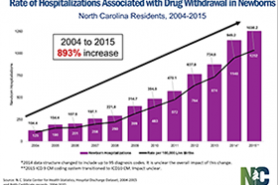Submitted by kmcochran on

Plan of Safe Care/CAPTA Q & A for Hospitals and Birth Centers
Monthly conference calls are being scheduled with the purpose to discuss and answer questions related to the implementation of CAPTA/Plan of Safe Care as it relates to the role of healthcare providers who work with newborns.
Hosts:
Dr. Kelly Kimple, Section Chief, Division of Public Health, Women’s and Children’s Health Section, NC DHHS
Dr. Gerri Mattson, Pediatric Medical Consultant, NC Division of Public Health, Children and Youth Branch, NC DHHS
Jessica Guice-Albritton, Policy Team, Program Consultant, North Carolina Division of Social Services, Child Welfare Section, NC DHHS
Additional members of the Plan of Safe Care Interagency Collaborative (POSCIC)
Dates and Times:
September 11th 8:30-9:30 AM
October 10th 4-5 PM
November 21st 12:30 - 1:30 PM
December 14th 4:00 - 5:00 PM
The intended participants are health care providers who work with newborns, including hospital based social workers.
*Prior to participating in the call, please view the recorded webinar found at link below, if you have not previously been exposed to information on this new federal legislation and state policy.*
Toll-Free Number
(877) 594-8353
Participant Pass Code
48729103
This webinar features Dr. Kelly Kimple, the NC Acting State Health Director, outlining the proposed role of hospitals in supporting North Carolina's implementation of recent federal Child Abuse Prevention and Treatment Act (CAPTA) amendment under the Comprehensive Addiction and Recovery Act (CARA) legislation.
A NC Plan of Safe Care Interagency Collaborative (POSCIC) has been working on the requirements of states to respond to the most recent federal legislation. Multiple agencies and entities have roles in meeting the needs of impacted infants and their families. Hospitals have a unique role. Specifically, currently health care providers who identify the occurrence of a substance exposed infant who meets the new North Carolina definitions of 'Affected by substance abuse, withdrawal or FASD', are required to notify child welfare services, though this should not be construed as a requirement of report of child maltreatment.
All such infants and their families are now also required to have a Plan of Safe Care developed, regardless of child welfare involvement. We believe that most hospitals who deliver infants who have been substance exposed, already have standards of discharge planning specific to the infants' circumstances. The Plan of Safe Care and corresponding screening tool that informs the Plan, would align with discharge planning and we believe provides increased clarity of how to respond to the non-medical needs of these infants and families.
We hope you will view the webinar to learn about the hospital's potential role in implementing practices that will improve outcomes for these infants and families and to provide feedback on how to best implement and incorporate it in established clinical flow.
Please share this with colleagues as appropriate.
View the webinar
